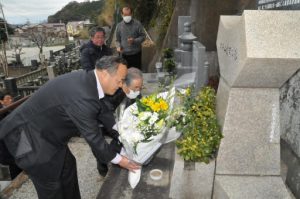Participants of memorial service commemorating March 1, “Bikini Day,” in Shizuoka vow to continue push against nuclear weapons
Mar. 1, 2020
(by Yo Kono, Staff Writer)
On March 1, 66 years ago, the Daigo Fukuryu Maru (the Lucky Dragon No. 5), a Japanese tuna fishing boat based in the port city of Yaizu, Shizuoka prefecture, was exposed to radioactive fallout from a U.S. hydrogen bomb test conducted at the Bikini Atoll, part of the Marshall Islands in the Pacific Ocean. On February 29, the day prior to the anniversary of the test—“Bikini Day” March 1—the Japan Congress Against A- and H-Bombs (Gensuikin) and other organizations held a memorial service in Kotokuin Temple, Yaizu, at the grave of Aikichi Kuboyama, who died from the test.
The memorial service was attended by six people, including Toshihiro Inoue, 61, assistant secretary general of Gensuikin, and Takao Suzui, 71, secretary general of the Gensuikin Shizuoka prefectural conference. During the memorial service, they placed flowers, burned incense, and observed a moment of silence at the grave of Mr. Kuboyama, who was on board the Lucky Dragon No. 5 as the boat’s radio operator.
With the spread of the new coronavirus, a rally originally scheduled for March 1 was cancelled and the February 29 memorial service scaled down. “It’s unfortunate the rally had to be cancelled, but we’ll hold firm and continue calling for opposition to and abolition of nuclear weapons, in consideration of this year’s Review Conference of the Parties to the Treaty on the Non-proliferation of Nuclear Weapons (NPT),” said Mr. Inoue.
The Japan Council against Atomic and Hydrogen Bombs (Gensuikyo) cancelled an assembly it had scheduled for February 28–March 1. However, the organization still plans to hold, in Kotokuin Temple, a related memorial service for Mr. Kuboyama, organized by the Japanese Conference on Religion and Peace, on March 1.
(Originally published on March 1, 2020)
On March 1, 66 years ago, the Daigo Fukuryu Maru (the Lucky Dragon No. 5), a Japanese tuna fishing boat based in the port city of Yaizu, Shizuoka prefecture, was exposed to radioactive fallout from a U.S. hydrogen bomb test conducted at the Bikini Atoll, part of the Marshall Islands in the Pacific Ocean. On February 29, the day prior to the anniversary of the test—“Bikini Day” March 1—the Japan Congress Against A- and H-Bombs (Gensuikin) and other organizations held a memorial service in Kotokuin Temple, Yaizu, at the grave of Aikichi Kuboyama, who died from the test.
The memorial service was attended by six people, including Toshihiro Inoue, 61, assistant secretary general of Gensuikin, and Takao Suzui, 71, secretary general of the Gensuikin Shizuoka prefectural conference. During the memorial service, they placed flowers, burned incense, and observed a moment of silence at the grave of Mr. Kuboyama, who was on board the Lucky Dragon No. 5 as the boat’s radio operator.
With the spread of the new coronavirus, a rally originally scheduled for March 1 was cancelled and the February 29 memorial service scaled down. “It’s unfortunate the rally had to be cancelled, but we’ll hold firm and continue calling for opposition to and abolition of nuclear weapons, in consideration of this year’s Review Conference of the Parties to the Treaty on the Non-proliferation of Nuclear Weapons (NPT),” said Mr. Inoue.
The Japan Council against Atomic and Hydrogen Bombs (Gensuikyo) cancelled an assembly it had scheduled for February 28–March 1. However, the organization still plans to hold, in Kotokuin Temple, a related memorial service for Mr. Kuboyama, organized by the Japanese Conference on Religion and Peace, on March 1.
(Originally published on March 1, 2020)








